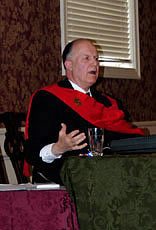 With the aid of a portable keyboard, TFP member Philip Calder gave a presentation called “The Power of Music,” to audiences in Topeka and Kansas City over the February 2-3 weekend.
With the aid of a portable keyboard, TFP member Philip Calder gave a presentation called “The Power of Music,” to audiences in Topeka and Kansas City over the February 2-3 weekend.
The topic awakened great interest as Mr. Calder took the audience through the great periods of music starting with Gregorian chant and finishing with modern music. He played music pieces while explaining the underlying philosophies behind some of the great and not-so-great music of history.
Mr. Calder explained how up until the latter nineteenth century, music still retained the basic elements of melody, harmony, rhythm, and form. However, at the turn of the twentieth century, composers took a radical turn away from sound musical traditions and became obsessed with novelty and senseless change. A current of thought developed that promoted the idea that man can impose no limits on music. Man can even create his own scales and shift the criteria as to what defines good music. Modern composers took an everything-goes relativistic attitude from which music still suffers today.
In the field of popular music, Mr. Calder also spoke of the development of an overly sentimental music. This type of music was directed solely towards the emotions rather than appealing both to the intellect and the emotions in a more balanced manner. As a result of the overemphasis on the sentimental, music eventually led to sounds and methods that reflected this radical departure away from reason. Music became disjointed and encouraged unnatural and almost tribal-like movements or even an almost trance-like response in the listener.
In the final analysis, Mr. Calder pointed to the fact that music has the power to influence ideas and lifestyles. Thankfully, those in attendance were able to begin the journey of understanding music’s immense power for good or evil.

